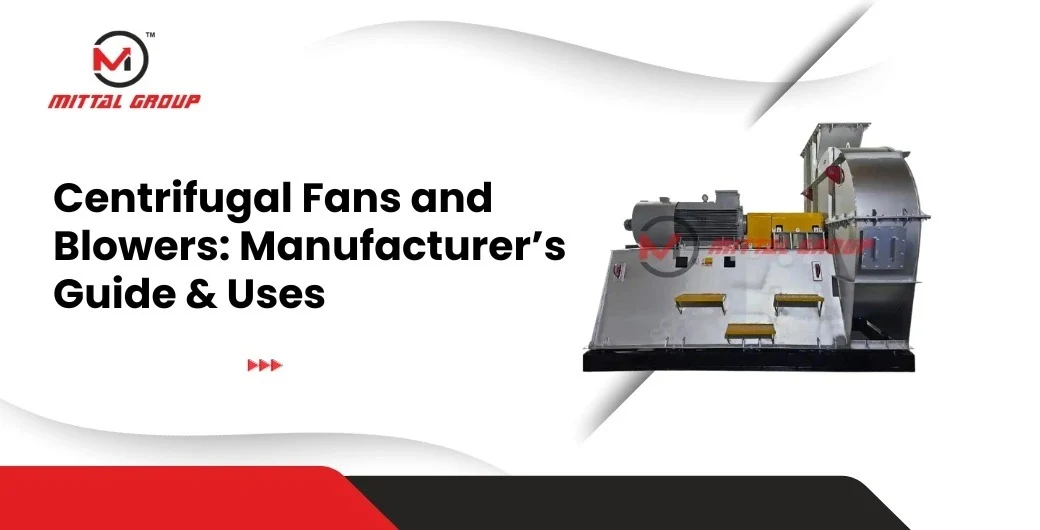Centrifugal Fans and Blowers: Manufacturer’s Guide & Uses

In the industrial world today, air movement is an important aspect in manufacturing, processing, and environmental control. Be it ventilation in factories, dust collection for workshops, or power plant cooling systems, centrifugal fans and blowers manufacturers offer solutions that guarantee safety, productivity, and reliability. This book reveals how centrifugal fans and blowers function, their uses in various industries, and some of the main considerations when choosing the proper equipment for your operations.
What Are Centrifugal Fans and Blowers?
A centrifugal fan or blower is a mechanical device designed to move air or gases using the kinetic energy generated by rotating impellers. Unlike axial fans, which push air parallel to the shaft, centrifugal fans discharge air at a 90-degree angle, resulting in higher pressure and more controlled airflow.
Key components include:
- Impellers or blades that spin to increase the velocity of air.
- Housing or casing that directs airflow.
- Inlet and outlet ducts that determine the efficiency and volume of air handled.
Because of their ability to generate higher pressures, centrifugal fans and blowers are especially suited for heavy-duty industrial applications.
Why Industries Trust on Centrifugal Fans
Whether small workshops or big manufacturing facilities, industries trust on centrifugal blowers due to the following reasons:
Longer lifespan– Made from tough material such as steel or aluminum, they can stand harsh environments like chemical plants or foundries.
Efficiency – New-age fans are designed to provide maximum airflow using less energy.
Flexibility – Available in different sizes and configurations to suit different industrial processes.
Safety – Good ventilation ensures proper air quality, minimizing health hazards to workers and fire risks due to combustible dust.
Centrifugal Fans and Blowers in the Steel Industry
One of the largest consumers of centrifugal blowers globally is the steel industry. From blast furnaces to rolling mills, maintaining airflow and temperature control is essential for efficiency and product quality.
Major Applications in Steel Plants:
Combustion Air Supply – Furnaces and kilns need reliable high-pressure air for thorough fuel combustion.
Cooling Systems – Red-hot steel slabs, billets, and rolled products require uniform cooling, which is abetted by heavy-duty industrial centrifugal blower systems.
Dust & Fume Extraction – Steel making produces toxic particulates and gases. Centrifugal blowers mounted on filtration units assist in workplace safety and environmental protection.
Boiler Operations – Power generation units within steel plants rely on ID (Induced Draft) and FD (Forced Draft) fans for proper combustion.
Ventilation – Large production floors require consistent air circulation to guarantee worker comfort and machinery operation.
The harsh conditions of steel plants require durable, high-performance blowers. Top centrifugal fans and blowers manufacturers provide customized solutions constructed using heat-resistant materials, advanced sealing systems, and high-strength impellers to sustain harsh conditions.
Major Industrial Uses Beyond Steel
Centrifugal blowers and fans play an important role in virtually every industry. Some of the most frequently used applications are listed below:
- HVAC Systems
They are the backbone of commercial complex, hospital, and manufacturing plant heating, ventilation, and air conditioning systems. Their high-pressure air flow provides low temperature control and clean indoor air.
- Dust Collection & Filtration
Industrial processes such as woodworking, cement, and pharmaceuticals create high levels of dust. Centrifugal blowers productivity moves dust-laden air to filters to meet safety requirements.
- Industrial Cooling
Devices such as furnaces, generators, and motors need cooling so they do not overheat. Industrial centrifugal blower devices are utilized to deliver constant streams of air for cooling to help extend the life of equipment.
- Material Handling
Certain centrifugal fans are designed to transport not only air but also light products like sawdust, powders, or granules.
- Sewage Treatment
Aeration blowers are utilized to provide oxygen to bacteria that digest organic matter, an important process in sewage treatment facilities.
Centrifugal Fans & Blowers: Full Manufacturer's Selection Guide
Choosing the Right Centrifugal Fan or Blower
Choosing the proper equipment involves more than simply choosing a fan size. Companies need to collaborate with trustworthy centrifugal fans and blowers manufacturers that can offer customized solutions. The main factors in mind are requirements for airflow, static pressure, working environment, efficiency, and sound control.
Conclusion
Centrifugal blowers and fans are highly important to industries across the globe, and their utilization in the steel industry is particularly necessary for combustion, cooling, and dust control. Knowing their applications and working in collaboration with major centrifugal fans and blowers manufacturers, companies can assure long-term productivity, safety, and performance.
Whether it is a steel mill that needs furnace blowers or a pharmaceutical facility that needs cleanroom air, the industrial centrifugal blower remains the pillar of dependable air flow in contemporary industries.
